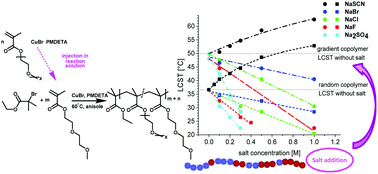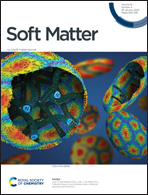Solubility behaviour of random and gradient copolymers of di- and oligo(ethylene oxide) methacrylate in water: effect of various additives†
Abstract
Poly[oligo(ethylene oxide)] based gradient and random copolymers with different compositions are synthesized via Cu-based atom transfer radical polymerization. The solubility behavior of these copolymers in pure water and in the presence of different salts, surfactants and ethanol is investigated. According to dynamic light scattering results, the lower critical solution temperature (LCST) depends on the structure of the copolymer and changes slightly in the presence of additives. Good cosolvents like ethanol can increase the LCST through dissolving the collapsed copolymer chains to some extent. The same effect is observed for surfactants that make the copolymer solution more stable by preventing aggregation. Above a certain concentration of surfactant, depending on the copolymer structure, the solution is stable at all temperatures (no LCST). The effect of salts on the solubility of the copolymers follows the Hofmeister series and it is related linearly to the salt concentration. Based on their affinity to the copolymer, the salts can increase or decrease the LCST. There is a considerable difference in phase transition changes for gradient or random copolymers after salt addition. While both copolymers show a two-step phase transition in the presence of different salts, the changes in the hydrodynamic radius and normalized scattering intensity are rather broad for random compared to gradient copolymers. Contrary to what was expected, varying the cations has no distinguishable effect on the LCST for both copolymers. All chlorides decrease the LCST. This decrease is almost the same for gradient copolymers and fluctuates for random copolymers.



 Please wait while we load your content...
Please wait while we load your content...